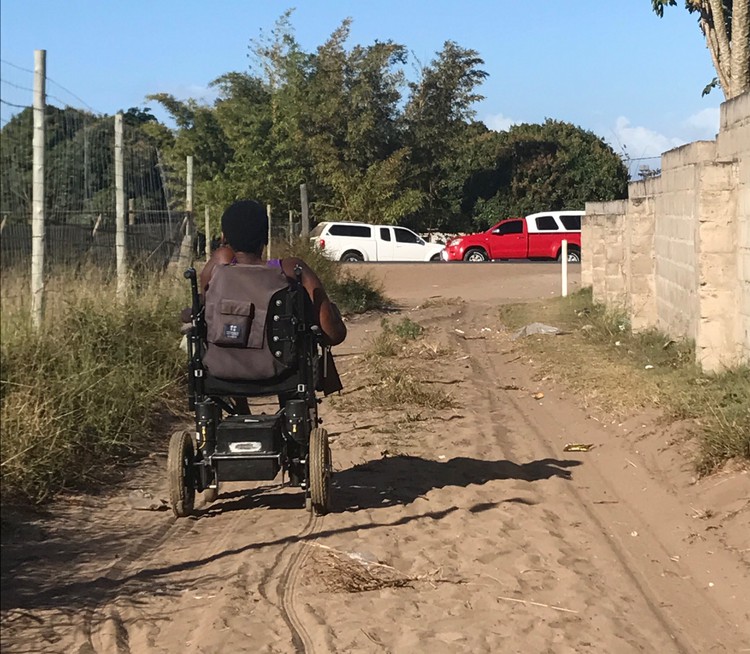Children with disabilities battle to get to school
Court application to force authorities to provide transport
The sand at the end of the dirt track that leads from her home makes it difficult for Makhosi Ndabande, 25, to reach the tarred road which runs from Manguzi Town in northern KwaZulu-Natal to Sizamnqubeko Combined School. Ndabande is a wheelchair user.
She is the oldest of four children and the only one with a physical disability in her household. She was born with muscular dystrophy, a group of diseases that cause progressive weakness and loss of muscle mass. She cannot dress herself or sit upright without help. Doctors have told her that her muscles would get progressively worse as she grows older. As a result of her illness, she started school much later than any of her siblings.
She entered Manguzi Primary, a mainstream school, at 11 and completed grades 1 to 3 before transferring to Sisizakele Special School, a primary school in Bambanani where she spent several years in grade 4 and 5. She fought to be admitted to a mainstream school and now attends Sizamnqubeko Combined School, a few kilometres from her home.
School begins at 8am, so Ndabande’s day starts at 4am. She gets up early to ensure that she is washed and ready, with help from her sister, by the time the van comes to collect her from home at 7am. For the van she pays R300 per month; R150 for herself and R150 for her wheelchair. Often the van driver does not arrive. She is left stranded and forced to drive herself five kilometres to school on her motorised wheelchair.
Many learners with disabilities face similar challenges, as SECTION27 found in research in the Umkhanyakude District in 2015. The research, which looked at conditions for children attending the 11 full service and three special schools in the district, found that many children requiring wheelchairs in rural areas without good roads and without transport provided, simply cannot attend school at all. At the special schools, the Department of Education has provided funding for two small buses for each school that transport a small proportion of learners to and from school each day. But Sisizakele Special School now has only one functional bus. These are mostly ordinary buses, not specifically equipped to accommodate learners who cannot sit up straight or who are in wheelchairs. The buses often break down, which means learners who usually use the transport simply cannot come to school.
Of the 11 full-service schools, only two currently receive direct support from the KwaZulu-Natal Department of Education for learner transport.
The buses cover a limited area, and only specific routes, so even learners who live a similar distance away from the school but in a different direction are required to stay in hostels. Buses at both special and full-service schools leave learners at a central point in towns or villages; the learners – including those with disabilities – have to go the rest of the way themselves
Most learners at full-service schools, who do not benefit from any transport, must either be brought to school privately through a system described as “Umalume Transport” (‘Uncle Transport’), or make their own way. These ‘uncles’ are merely men with cars (often bakkies) who attempt to load as many children as possible into their vehicles and are often uncaring and rude towards children with disabilities. Both of these options carry the risks of sexual violence, theft, and physical danger from accidents.
Parents have reported that the prices for private transport are very high and there are months when they are forced to choose between sending their children to school and a family emergency.
Since 2014, Equal Education has been campaigning for safe, government-subsidised scholar transport in KwaZulu-Natal and the rest South Africa. EE has now brought a case against the KwaZulu-Natal Departments of Education and Transport in relation to 12 schools in Nqutu, which will be heard on 7 November.
SECTION27 is intervening as friend of the court (amicus curiae) in this case, to bring to light the examples of learners with disabilities uncovered during the course of our research.
SECTION27 will support the demand for a plan that also addresses the needs of learners with disabilities. In the interim, learners like Ndabande continue to put their lives in danger in order to access a quality education. Ndabande is fortunate to have received a motorised wheelchair last year. This allows her to be more independent. But she still faces significant challenges in getting to school when her mother cannot afford to pay for private transport.
Mpulo is senior communications officer at SECTION27. Views expressed are not necessarily those of GroundUp.
Support independent journalism
Donate using Payfast

Next: How Metrorail treats commuters
Previous: Ward committee members accused of renting out people’s RDP houses
© 2017 GroundUp. 
This article is licensed under a Creative Commons Attribution-NoDerivatives 4.0 International License.
You may republish this article, so long as you credit the authors and GroundUp, and do not change the text. Please include a link back to the original article.

